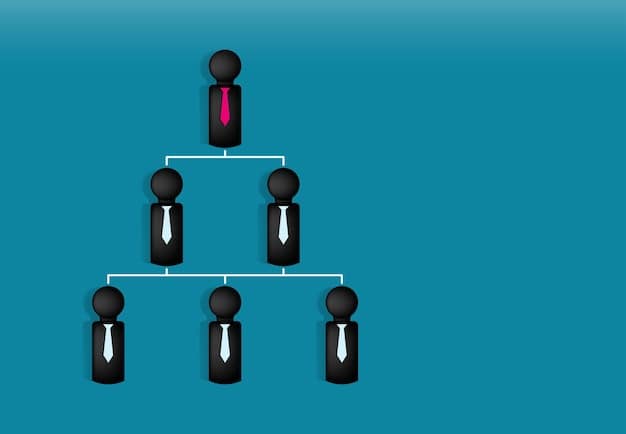Co-founder Power Dynamics: Leadership, Roles, and Decisions

Co-founder power dynamics involve navigating leadership roles, decision-making processes, and conflict resolution to ensure a balanced and effective partnership that drives the startup’s success.
Navigating the complexities of a startup requires more than just a brilliant idea; it demands a well-defined and balanced co-founder relationship. Understanding co-founder power dynamics is crucial for establishing clear leadership roles and efficient decision-making processes, setting the stage for long-term success.
Understanding Co-founder Power Dynamics
Co-founder relationships are at the heart of most successful startups. Understanding and managing power dynamics within these relationships is crucial for stability and growth. Let’s delve into why these dynamics matter.
Power dynamics in a co-founding team often stem from various factors, including individual expertise, investment contributions, and pre-existing relationships. Recognizing these sources of power is the first step in creating a balanced and effective leadership structure.
The Importance of Recognizing Different Power Sources
Recognizing the sources of power in a co-founding team helps in managing expectations and preventing conflicts. It allows for a more equitable distribution of responsibilities and authority.
Potential Conflicts Arising from Power Imbalances
When power is not distributed fairly, it can lead to resentment, decreased morale, and ultimately, the failure of the startup. Addressing these imbalances proactively is essential for maintaining a healthy co-founder relationship.
- Openly discuss each co-founder’s strengths and contributions.
- Establish clear roles and responsibilities based on expertise.
- Create a decision-making framework that includes input from all co-founders.
- Regularly review and adjust the power dynamic as the company evolves.
Cultivating a transparent and communicative environment can mitigate negative impacts and promote a collaborative atmosphere. Recognizing and addressing power dynamics helps co-founders work together harmoniously.

Defining Leadership Roles and Responsibilities
Establishing clear leadership roles and responsibilities is vital for steering a startup in the right direction. Without well-defined roles, confusion and conflict can easily arise. Here’s how to approach it:
Clearly defined roles and responsibilities create accountability and efficiency within the co-founding team. When each co-founder knows their specific duties, the team can operate with greater precision and less overlap.
Strategies for Defining Co-founder Roles
One effective strategy is to identify each co-founder’s unique strengths and passions. Aligning roles with these strengths ensures that everyone is contributing in areas where they excel. Discussing and documenting these roles prevents misunderstandings.
Aligning Strengths and Interests with Responsibilities
When co-founders are passionate about their responsibilities, they are more likely to be engaged and driven. Assigning roles based on interest and skills fosters a positive and productive work environment.
- Conduct a skills and interests assessment for each co-founder.
- Assign roles based on the assessment results and team needs.
- Document roles and responsibilities in a shared document.
- Regularly review and adjust roles as the company grows.
Defining leadership roles also involves clarifying who has the final say in specific areas. This clarity helps prevent conflicts and ensures that decisions are made efficiently. Establishing a well-defined leadership structure is crucial for startup success.
Effective Decision-Making Processes
Efficient decision-making is paramount for startup agility. A well-defined process ensures that decisions are made quickly and with the best possible information. Let’s see how co-founders can navigate this.
Establishing clear decision-making processes helps streamline operations and reduces the risk of delays. When everyone understands how decisions are made, the team can respond more effectively to challenges and opportunities.
Establishing Clear Decision-Making Protocols
One common approach is to identify different types of decisions and assign authority based on expertise. For example, the CTO might have the final say on technical decisions, while the CEO manages strategic direction.
The Role of Consensus vs. Authority
Balancing consensus-building with the need for decisive action is crucial. While it’s important to seek input from all co-founders, there are times when a single leader must make a call. Establishing clear guidelines for these situations is essential.
- Define decision thresholds (e.g., major vs. minor decisions).
- Assign decision-making authority based on expertise.
- Establish a process for resolving disagreements.
- Document the decision-making process in a shared guide.
Effective decision-making also involves creating a culture of open communication. Co-founders should feel comfortable expressing their opinions and challenging assumptions. This openness leads to better decisions and a stronger team.
Communication and Conflict Resolution
Open communication and a proactive approach to conflict resolution are essential for maintaining a healthy co-founder relationship. Conflicts will inevitably arise, but how they are handled can make or break a startup.
Effective communication is the backbone of any successful co-founding team. Open and honest communication fosters trust, prevents misunderstandings, and promotes a collaborative spirit.
Strategies for Open Communication
One effective strategy is to establish regular check-in meetings where co-founders can share updates, address concerns, and provide feedback. Creating a safe space for honest dialogue is essential.
Conflict Resolution Techniques
When conflicts arise, it’s important to address them promptly and constructively. Techniques like active listening, empathy, and mediation can help co-founders find common ground and resolve disputes amicably.
- Schedule regular check-in meetings for open dialogue.
- Practice active listening and empathy.
- Establish a mediation process for resolving disputes.
- Seek external advice from mentors or advisors when needed.
Creating a culture of mutual respect and understanding can significantly reduce the frequency and severity of conflicts. Co-founders who are committed to open communication and conflict resolution are better equipped to navigate the challenges of building a startup.
Documenting Agreements and Expectations
Formalizing agreements and expectations in writing provides clarity and protection for all co-founders. A well-drafted co-founders’ agreement can prevent misunderstandings and disputes down the road.
Documenting agreements and expectations creates a shared understanding of each co-founder’s rights and responsibilities. This clarity helps prevent conflicts and ensures that everyone is on the same page.
The Importance of a Co-founders’ Agreement
A co-founders’ agreement should outline key aspects of the relationship, including equity distribution, roles and responsibilities, decision-making processes, and exit strategies. It serves as a roadmap for the co-founding team.
Key Elements to Include in the Agreement
Important elements to include in the agreement are: equity vesting schedules, intellectual property ownership, dispute resolution mechanisms, and provisions for handling the departure of a co-founder.
- Equity distribution and vesting schedules
- Roles and responsibilities of each co-founder
- Decision-making processes and authority
- Intellectual property ownership
Seeking legal advice when drafting a co-founders’ agreement is highly recommended. An experienced attorney can help ensure that the agreement is comprehensive and legally sound. This investment can save significant time and resources in the long run.
Adapting to Change and Growth
Startups are dynamic environments, and co-founder dynamics must evolve alongside the company. Flexibility and adaptability are crucial for long-term success. Here’s how to ensure relevance.
As a startup grows, the roles and responsibilities of co-founders may need to shift to accommodate new challenges and opportunities. Being able to adapt to change is essential for continued success.
Reassessing Roles and Responsibilities
Periodically reassessing roles and responsibilities ensures that each co-founder is contributing in the most effective way. This process may involve adjusting responsibilities or even redefining roles altogether.
Strategies for Continuous Improvement
Implementing strategies for continuous improvement can help co-founders identify areas for growth and development. Seeking feedback from mentors, advisors, and team members can provide valuable insights.
- Regularly reassess roles and responsibilities.
- Seek feedback from mentors and advisors.
- Invest in professional development opportunities.
- Foster a culture of continuous learning and improvement.
By embracing change and focusing on continuous improvement, co-founders can position themselves and their startup for long-term success. Adaptability is a key ingredient in navigating the ever-changing landscape of the startup world.
Conclusion
In conclusion, navigating co-founder power dynamics is crucial for any startup’s success. By understanding the sources of power, defining leadership roles, establishing effective decision-making processes, and prioritizing open communication and conflict resolution, co-founders can create a strong and resilient partnership. Documenting agreements and adapting to change are also essential for long-term success. Remember, a balanced and collaborative co-founder relationship is a valuable asset in the challenging journey of building a startup.
| Key Point | Brief Description |
|---|---|
| 🤝 Understand Dynamics | Recognize power sources to manage expectations. |
| 🎯 Define Roles | Assign roles based on strengths to foster accountability. |
| 🗣️ Communications | Establish open channels to prevent misunderstandings. |
| 🤝 Document | Formalize all agreements to provide clarity and protection. |
What are the common sources of power imbalances in co-founder relationships?
Power imbalances often arise from factors like different levels of expertise, unequal financial contributions, or pre-existing friendships that influence decisions, leading to potential conflicts.
Does establishing clear roles and responsibilities really prevent conflicts?
Yes, it significantly reduces conflicts, as each co-founder knows their domain and accountabilities, minimizing overlap and confusion that can lead to disputes.
What Happens if We Do Not Plan for Communication?
Without planning for communication, the business has a higher likelihood of failure due to common business communication errors and misunderstandings that can be avoided.
Why is it so important to document co-founder agreements?
Documenting such agreements ensures legal clarity and lays out the rights and responsibilities of each party, preventing disputes by pre-defining the terms of the partnership.
How does adapting to company change and growth impact roles?
As your business scales, your roles and responsibilities can shift depending on who has the skill set for each task at that time. This will lead to a stronger business.
How do co-founders navigate power dynamics to foster strong leadership, decision-making, and overall success?
By acknowledging each other’s strengths, clearly defining roles, and keeping open communication in order to foster a healthy co-founder relationship.
▼
Power imbalances often arise from factors like different levels of expertise, unequal financial investment, or pre-existing friendship bonds, which can inadvertently skew decision-making processes.
▼
Yes, it significantly reduces conflicts, as each co-founder knows their specific domain and accountabilities, minimizing overlap and confusion that can lead to disputes and misunderstandings.
▼
Without planning for open commination and documentation of important information, the business has higher chance of failure due to common business communication errors and misunderstandings.
▼
Documenting such agreements ensures legal clarity, laying out the rights and responsibilities for each party involved. This reduces conflict by clearly having outlined details beforehand.
▼
As the business scales, roles and responsibilities can shift depending on who has the skill set for the task at hand. Being open to changes lead to a more efficient business structure and improved workflow.
Conclusion
Startups require balanced co-founder partnerships. The importance of open communication, clear structures, and documented agreements cannot be overstated. Keep these principles in mind.





